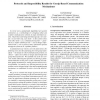Free Online Productivity Tools
i2Speak
i2Symbol
i2OCR
iTex2Img
iWeb2Print
iWeb2Shot
i2Type
iPdf2Split
iPdf2Merge
i2Bopomofo
i2Arabic
i2Style
i2Image
i2PDF
iLatex2Rtf
Sci2ools
137
click to vote
FOCS
2002
IEEE
2002
IEEE
Protocols and Impossibility Results for Gossip-Based Communication Mechanisms
In recent years, gossip-based algorithms have gained prominence as a methodology for designing robust and scalable communication schemes in large distributed systems. The premise underlying distributed gossip is very simple: in each time step, each node v in the system selects some other node w as a communication partner — generally by a simple randomized rule — and exchanges information with w; over a period of time, information spreads through the system in an “epidemic fashion”. A fundamental issue which is not well understood is the following: how does the underlying low-level gossip mechanism — the means by which communication partners are chosen — affect one’s ability to design ef£cient high-level gossip-based protocols? We establish one of the £rst concrete results addressing this question, by showing a fundamental limitation on the power of the commonly used uniform gossip mechanism for solving nearest-resource location problems. In contrast, very ef£cient pro...
Communication Partners | FOCS 2002 | Gossip Mechanisms | Theoretical Computer Science | Uniform Gossip |
Related Content
| Added | 14 Jul 2010 |
| Updated | 14 Jul 2010 |
| Type | Conference |
| Year | 2002 |
| Where | FOCS |
| Authors | David Kempe, Jon M. Kleinberg |
Comments (0)

